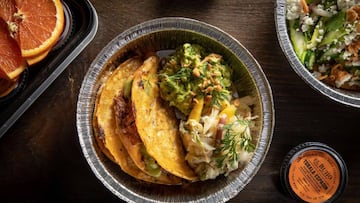Coronavirus: Can you get Covid-19 from food and food packaging?
Although extreme caution is recommended when it comes to hygiene, there is a low risk of coronavirus infection from food or its packaging.

You are extremely unlikely to catch the coronavirus by eating infected food or by handling products and packaging that have come into contact with Covid-19.
"No evidence" of Covid-19 transmission through food
"Coronaviruses are generally thought to be spread from person to person through respiratory droplets," the United States’ Centers for Disease Control and Prevention (CDC) clarifies in its guidance on the issue.
"Currently, there is no evidence to support transmission of Covid-19 associated with food."
Coronavirus: "Poor survivability" on surfaces, "cannot multiply in food"
Speaking to the news agency PA, Cambridge University Department of Medicine professor Dr Stephen Baker has explained that the coronavirus' short window of survival on surfaces ensures that there is a "really low" chance of people catching Covid-19 by consuming food with the virus on it.
The World Health Organization (WHO) agrees that you are not likely to ingest the virus while eating, adding: "Coronaviruses cannot multiply in food; they need an animal or human host to multiply."
Meanwhile, although the CDC does concede that it "may be possible" for someone to get Covid-19 by "touching a surface or object, like a packaging container, that has the virus on it and then touching their own mouth, nose, or possibly their eyes", it stresses that this "is not thought to be the main way the virus spreads."
The CDC concludes: “In general, because of poor survivability of these coronaviruses on surfaces, there is likely very low risk of spread from food products or packaging."
See also:
Contact with other people poses greatest Covid-19 risk
In its guidelines on handling and preparing food, furthermore, UNICEF notes: “The greater risk comes from being in close contact with other people while outside food shopping or receiving a food delivery."
Despite the low risk of infection from food and packaging, however, there are recommended safety measures that you can put into practice, as UNICEF explains in its tips on hygiene during the Covid-19 crisis:
- Remove and dispose of unnecessary packaging, using a bin that has a lid
- Take-away food should be removed from its containers (which should be thrown away immediately) and placed on a clean plate
- Wipe cans and similar packaging clean with a disinfectant before opening/storing
- Unpackaged produce - e.g. fruit and vegetables - should be washed thoroughly
- After handling food and packaging, wash your hands with soap and water or an alcohol-based hand lotion
It is also advisable to maintain general good hygiene practices such as washing your hands before preparing, cooking or consuming food, and making sure that all kitchen surfaces and chopping boards are clean before you use them.
See also:
Live coverage of the coronavirus pandemic
Related stories
You can stay up-to-date with the latest developments in the coronavirus crisis by following our live blog.
We also have dedicated rolling feeds for the United States, India and Africa.